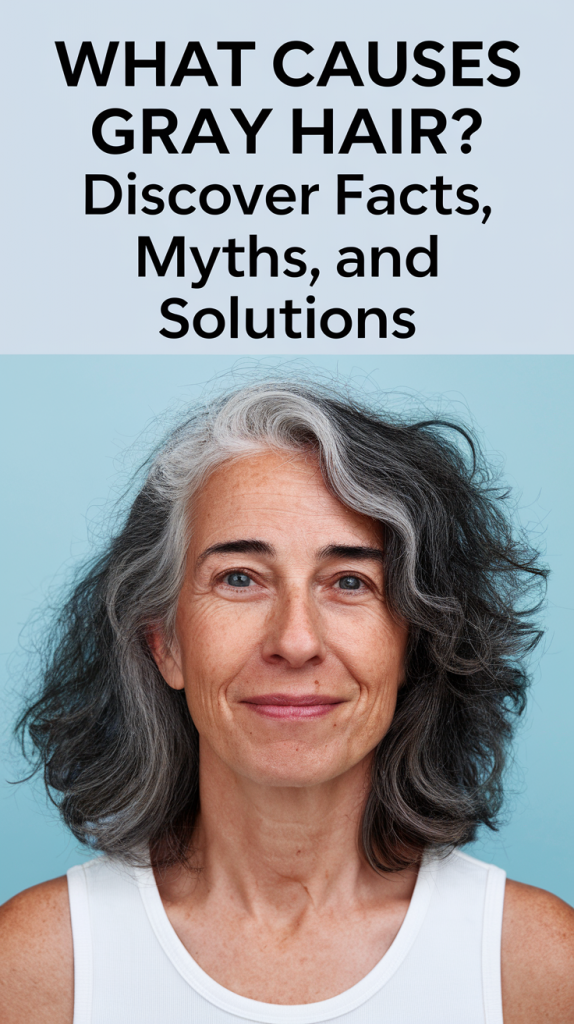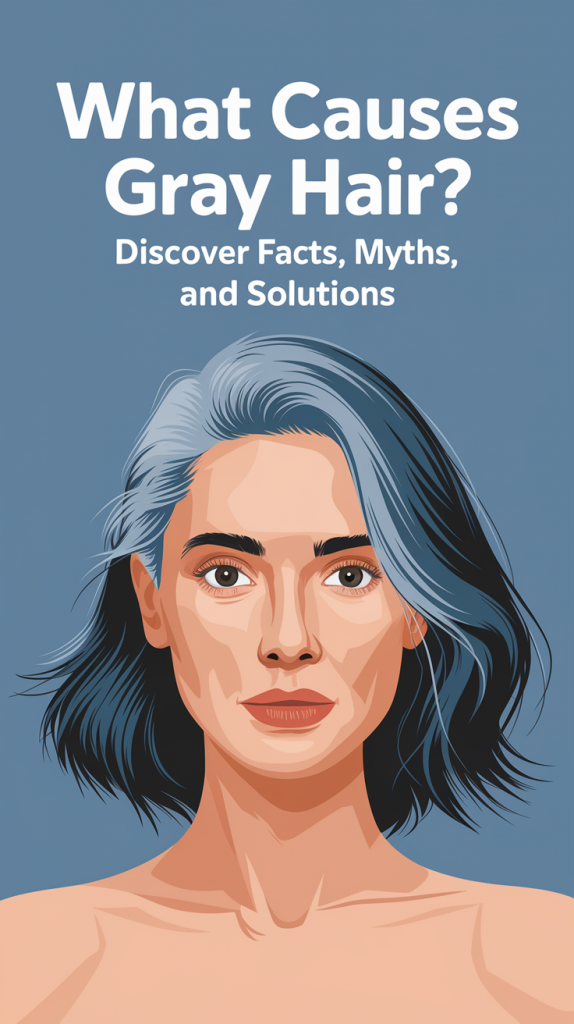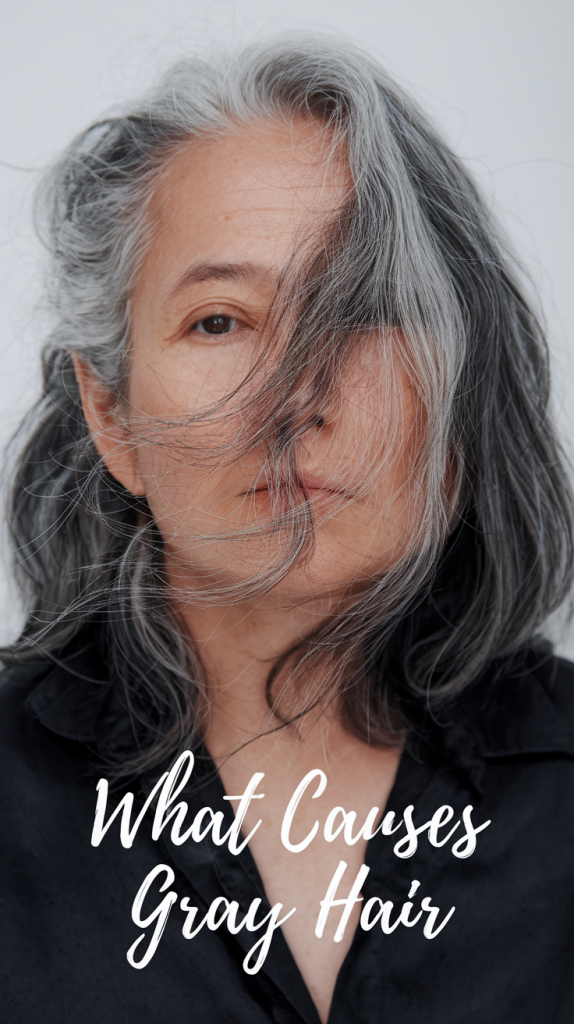What Causes Gray Hair?
Have you ever wondered why your hair turns gray? On the surface, it seems like a simple part of aging, but the reality is far more complex and fascinating. Gray hair is influenced by genetics, lifestyle, stress, and even environmental factors. As someone who has delved deep into this topic, I’m here to explain the science behind it and offer tips to help you understand this natural phenomenon. Let’s explore the causes of gray hair and whether anything can slow down or even reverse the process.

The Science Behind Hair Pigmentation
Hair gets its color from melanin, produced by cells called melanocytes in the hair follicles. There are two types of melanin:
- Eumelanin, which gives black and brown shades.
- Pheomelanin, responsible for red and yellow hues.
When these melanocytes reduce melanin production, hair begins to lose its color, appearing gray, silver, or white. Let’s take a closer look at what causes this change.
What Causes Gray Hair?
1. Genetics: The Main Factor
If you’ve noticed gray hairs earlier than your peers, you can likely thank your genes. Genetics largely dictate when your melanocytes start producing less melanin. For instance:
- Caucasians often start graying in their mid-30s.
- Asians experience it in their late 30s.
- Africans tend to see gray hair in their mid-40s.

Table 1: Average Onset of Gray Hair by Ethnicity
| Ethnicity | Average Age of Graying |
|---|---|
| Caucasian | Mid-30s |
| Asian | Late-30s |
| African | Mid-40s |
2. Aging: A Natural Process
Aging is inevitable, and graying is a visible part of it. As we age, our hair follicles experience oxidative stress, which damages melanocytes. Over time, these cells lose their ability to produce pigment.
3. Stress and Gray Hair
You’ve likely heard that stress can turn your hair gray, and this isn’t entirely a myth. Chronic stress depletes melanocyte stem cells, which are essential for maintaining hair pigment. While stress won’t cause instant graying, prolonged periods of stress can accelerate the process.
4. Nutritional Deficiencies
Certain nutrient deficiencies are linked to premature graying:
- Vitamin B12: Essential for red blood cell production and healthy hair.
- Copper: Necessary for melanin synthesis.
- Iron and Zinc: Important for scalp and hair health.

Table 2: Nutrients Essential for Hair Pigmentation
| Nutrient | Role in Hair Health | Sources |
|---|---|---|
| Vitamin B12 | Pigment production | Fish, eggs, dairy |
| Copper | Melanin synthesis | Nuts, seeds, shellfish |
| Iron | Scalp blood flow | Spinach, red meat, lentils |
| Zinc | Follicle health | Pumpkin seeds, legumes |
5. Environmental Factors
Pollution, UV radiation, and exposure to chemicals can create free radicals that damage melanocytes. Over time, these environmental factors contribute to oxidative stress, accelerating hair graying. Protecting your hair with UV-blocking products can help reduce the impact.
6. Smoking and Lifestyle Choices
Studies show that smokers are up to 2.5 times more likely to experience premature graying. The toxins in cigarette smoke damage hair follicles and create oxidative stress.
7. Health Conditions
Certain medical issues are also linked to gray hair:
- Thyroid Disorders: Can disrupt melanin production.
- Vitiligo: Causes a loss of pigmentation in both skin and hair.
- Anemia: Impacts scalp health, indirectly affecting hair color.

Debunking Myths About Gray Hair
- Does plucking gray hairs cause more to grow?
No, plucking a gray hair won’t cause others to sprout, but it can damage the follicle. - Can stress instantly turn your hair gray?
No, while stress accelerates graying, it doesn’t happen overnight. - Can diet reverse gray hair?
No, but a healthy diet can slow the process and support overall hair health.
Innovations in Gray Hair Research
Science is making strides toward understanding and possibly reversing gray hair. Some promising developments include:
- Gene Therapy: Targeting genes responsible for melanin production.
- Antioxidant Treatments: Neutralizing free radicals to protect melanocytes.
- Stem Cell Research: Regenerating melanocytes to restore hair pigment.
How to Prevent or Slow Gray Hair
While it’s impossible to stop gray hair entirely, adopting healthy habits can delay the process:
- Reduce Stress: Practice meditation or yoga to lower cortisol levels.
- Eat a Balanced Diet: Include foods rich in vitamins and minerals.
- Quit Smoking: Protect your hair and overall health.
- Use UV Protection: Prevent damage caused by sunlight.
Conclusion
Gray hair is a natural part of life, and while genetics play the biggest role, lifestyle and environmental factors can accelerate the process. Embracing healthy habits can help you maintain vibrant, strong hair for longer. Whether you choose to celebrate your silver strands or explore ways to delay graying, the key is understanding your hair’s unique needs.
FAQs
1. At what age does gray hair typically appear?
Gray hair usually appears in your 30s, but this varies by ethnicity and genetics.
2. Can stress cause gray hair?
Yes, chronic stress can accelerate the graying process by depleting melanocyte stem cells.
3. Does plucking gray hair make more grow?
No, but frequent plucking can damage hair follicles and lead to thinning.
4. Can gray hair be reversed naturally?
Currently, there’s no proven way to reverse gray hair naturally.
5. What nutrients can prevent gray hair?
Vitamin B12, copper, iron, and zinc are essential for maintaining hair pigment.
6. Does smoking cause gray hair?
Yes, smoking increases oxidative stress, which can lead to premature graying.

